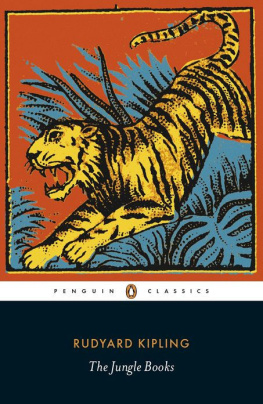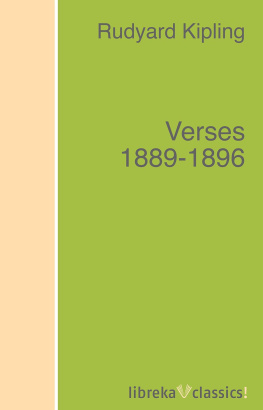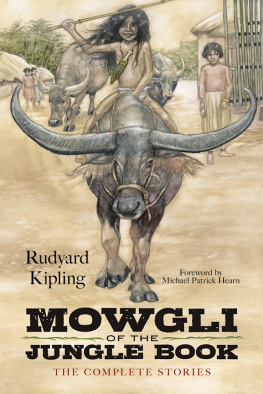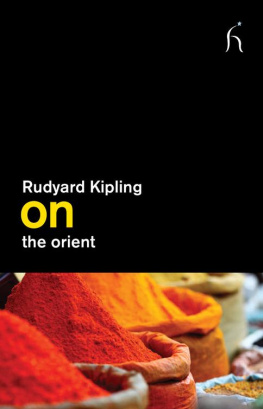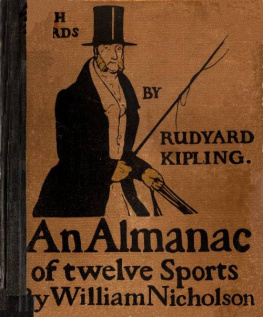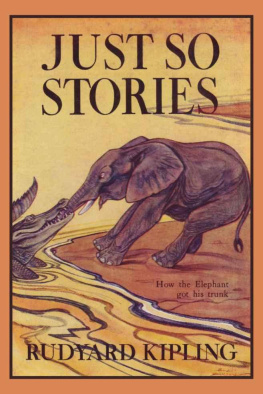Rudyard Kipling [Kipling - The Jungle Books
Here you can read online Rudyard Kipling [Kipling - The Jungle Books full text of the book (entire story) in english for free. Download pdf and epub, get meaning, cover and reviews about this ebook. year: 2013, publisher: Penguin UK, genre: Art. Description of the work, (preface) as well as reviews are available. Best literature library LitArk.com created for fans of good reading and offers a wide selection of genres:
Romance novel
Science fiction
Adventure
Detective
Science
History
Home and family
Prose
Art
Politics
Computer
Non-fiction
Religion
Business
Children
Humor
Choose a favorite category and find really read worthwhile books. Enjoy immersion in the world of imagination, feel the emotions of the characters or learn something new for yourself, make an fascinating discovery.
- Book:The Jungle Books
- Author:
- Publisher:Penguin UK
- Genre:
- Year:2013
- Rating:3 / 5
- Favourites:Add to favourites
- Your mark:
- 60
- 1
- 2
- 3
- 4
- 5
The Jungle Books: summary, description and annotation
We offer to read an annotation, description, summary or preface (depends on what the author of the book "The Jungle Books" wrote himself). If you haven't found the necessary information about the book — write in the comments, we will try to find it.
Rudyard Kipling [Kipling: author's other books
Who wrote The Jungle Books? Find out the surname, the name of the author of the book and a list of all author's works by series.
The Jungle Books — read online for free the complete book (whole text) full work
Below is the text of the book, divided by pages. System saving the place of the last page read, allows you to conveniently read the book "The Jungle Books" online for free, without having to search again every time where you left off. Put a bookmark, and you can go to the page where you finished reading at any time.
Font size:
Interval:
Bookmark:

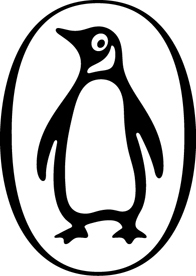
Edited and with an Introduction and Notes by
KAORI NAGAI


PENGUIN  CLASSICS
CLASSICS
SERIES EDITOR: JAN MONTEFIORE
RUDYARD KIPLING , born in December 1865 in Bombay (now Mumbai), was taken to England in 1871 with his younger sister Alice and left for five years with an abusive foster-family in Southsea, after which he was sent to the United Services College in Devon, the public school affectionately recalled in Stalky & Co. (1899). He returned to India in the autumn of 1882 to work as a reporter. The poems, sketches and stories which he wrote during his Seven Years Hard in India, especially the series Plain Tales from the Hills, published as a book in 1888, won him immediate acclaim and, from his arrival in London in 1889, worldwide literary celebrity. This was increased by the powerful stories collected in Lifes Handicap and the originality of Barrack-Room Ballads (1892), whose poems Mandalay, Tommy and Gunga Din became immensely popular performance items in music-halls which, like hymns and ballads, were a lasting influence on Kiplings verse.
In 1892 Kipling married the American Caroline Balestier and lived with her in Vermont for four happy years, during which their daughters Josephine and Elsie were born and Kipling wrote some of his best work, including the two Jungle Books (1894, 1895). They moved to England in 1896, settling in Rottingdean, East Sussex, where their son John was born, and eventually at the house Batemans, at Burwash. Kipling continued to travel widely with his family, spending nearly all the winters from 1898 to 1908 in South Africa. On a trip to New York in 1899, his six-year-old daughter Josephine died of pneumonia, which Kipling himself narrowly survived.
Kipling published his masterpiece, Kim, in 1901, and the Just So Stories in 1902. He turned to the theme of Englishness and history in his childrens books Puck of Pooks Hill (1906) and Rewards and Fairies (1910), interweaving poems and stories to subtle intertextual effect. His stories for adults after 1900 focus on the lives of ordinary people, uniquely combining a creative response to the new twentieth-century technologies of communication with a strong imaginative feeling for the strange and the numinous, intensified by his pared-down, understated style. His public poems, including Recessional, The White Mans Burden and The Islanders, all printed in The Times, preached the virtues of patriotism and duty.
From the outset, Kipling identified with the rulers and officials of the British Empire, although he was never their servant (he refused both a knighthood and the Order of Merit). Yet he sympathized deeply with children, outlaws and outsiders, who often engaged his best energies as a writer, as witnessed by the vitality and subtlety of the Jungle Books and Kim. He was a strong supporter of the Boer War, for which he wrote journalism and propaganda; this, together with the hardening of his conservative political views after 1900, made him increasingly unpopular with liberals and anti-imperialists. Kipling returned their dislike. His books continued to sell and to be read widely and he was awarded honorary doctorates by many universities and the Nobel Prize in 1907, but he never again enjoyed the brilliant reputation which he had held in the 1890s.
In the First World War, Kipling remained a strongly patriotic writer, but after the blow of losing his son John at the Battle of Loos in 1915 he became a more private man. He none the less played a major role in the War Graves Commission, arguing successfully for equality of treatment for all ranks and choosing the inscriptions for the memorial stones. He commemorated the dead in his own moving Epitaphs of the War and his History of the Irish Guards in the Great War (1923), an account of his sons regiment. His late stories of loss and bereavement are written with an acuteness and subtlety not always perceived by their contemporary readers.
Kipling died in 1936.
KAORI NAGAI teaches at the University of Kent. She is the author of Empire of Analogies: Kipling, India and Ireland (2006) and of many articles on colonial discourses in the nineteenth century. She has edited Kiplings Plain Tales from the Hills for Penguin Classics and has co-edited a collection of essays on Rudyard Kipling entitled Kipling and Beyond (2010).
JAN MONTEFIORE is Professor of Twentieth-Century English Literature at the University of Kent at Canterbury. Her books include Rudyard Kipling (2007).
Rudyard Kipling (18651936) was a Victorian and an early modernist, a preacher of the imperialist virtues of discipline and duty whose imaginative sympathies lay with children and outlaws, and a lover of the stability of Old England who much enjoyed travelling outside it. He was a world-famous author, the most genuinely popular English writer since Dickens, and his poem If is to this day read and admired by people who do not otherwise read poetry; yet when his ashes were interred in Westminster Abbey he was considered by many intellectuals as barely worth serious reading, even though he was admired by T. S. Eliot, Bertolt Brecht, W. H. Auden and Andr Gide. The 35-volume Sussex Edition of his work represents an extraordinary diversity: Kim and three other long prose fictions including The Light That Failed; eleven collections of stories, from Plain Tales from the Hills (1888) to Limits and Renewals (1932); seven books for children (the two Jungle Books, the Just So Stories, the two Puck books, Stalky & Co. and Land and Sea Tales for Scouts and Guides); journalism, propaganda, public speeches and travel writing, the little-read classic History of the Irish Guards in the Great War, a great deal of verse and the posthumous memoir Something of Myself. A virtuoso of the short story, he wrote ironic comedies and tragic dramas, tales of adventure and of work, ghost stories, revenge farces, psychological studies, animal fables and machine fables. D. H. Lawrence is the only English writer of the twentieth century who can match his record for brilliant and diverse writing which escapes conventional classifications, and as a storyteller he has no contemporary English rival.
Kiplings work is as much energized as fissured by these contradictions, the roots of which lie in his own childhood experiences of dislocation and exile. Born in Bombay, where his first language was the vernacular Hindi spoken by the servants, who would remind him on visits to the drawing room to Speak English to Papa and Mamma, he was as a small child taken to England with his sister and left with a foster-family in Southsea, to endure six years of bullying and abuse culminating in near-blindness and some sort of nervous breakdown. After four years at a tough public school which he came to enjoy, he returned to his family and a gruelling job as reporter, which reintroduced him both to Indias rich glamour and to a colonial world where life was cheap and death common. He insisted that his harsh childhood had proved an asset to his career in that it taught him to survive by inventing stories and entering other imaginative worlds, while observing others behaviour with due wariness and maintaining his independence. But the unforgotten rage, hatred and despair of the dark years in the House of Desolation, mitigated by a delight in imaginative play, continued to shadow his work in his identification with the stern wisdom of just authority, and in his fascination by the strange worlds beyond its understanding.
Font size:
Interval:
Bookmark:
Similar books «The Jungle Books»
Look at similar books to The Jungle Books. We have selected literature similar in name and meaning in the hope of providing readers with more options to find new, interesting, not yet read works.
Discussion, reviews of the book The Jungle Books and just readers' own opinions. Leave your comments, write what you think about the work, its meaning or the main characters. Specify what exactly you liked and what you didn't like, and why you think so.

